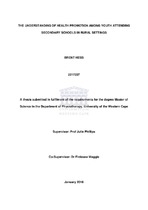The understanding of health promotion among youth attending secondary schools in rural settings
Abstract
Background: Several chronic health conditions that previously manifested in adulthood are now increasingly being identified in young people. Various health risk behaviours established during youth results in chronic diseases of lifestyle as well as behaviours leading to injury, trauma and substance abuse. Current evidence proposes that a school health programme could become one of the most efficient means available to improve the health promotion and education of people as it reaches large numbers of young people in a replicable and sustainable way. Aim: The purpose of the study was to determine health risk behaviours and investigate the understanding and perception of health promotion among adolescent learners attending secondary schools in the Theewaterskloof region. Objectives: 1) To determine the health risk behaviours that secondary school learners in the Theewaterskloof region engage in; 2) to explore and describe the understanding and perceptions of health promotion among secondary school learners in the Theewaterskloof region and 3) To explore and describe the understanding and perceptions of health promotion among life orientation educators in the Theewaterskloof region Methodology: The study used a sequential explanatory mixed methods approach. Quantitative data was collected by means of the Youth Risk Behaviour Surveillance Survey and qualitative data through focus group discussions. Ethics was obtained from the Research Ethics Committee of the University of the Western Cape (13/2/3) and permission was obtained from the Western Cape Education Department, school governing bodies, learners, parents and guardians of identified schools regarding the research. Results: Data from 276 participants in Grades 8-11 from secondary schools in a rural district within the Western Cape, South Africa was analysed. The most significant health risk behaviours engaged in by the participants was substance abuse, sexual activity and physical inactivity. In focus group discussions held with both the learners and educators, the most prevalent health risk behaviours were; substance use and sexual activity. Although the health risk behaviours were such a pertinent issue for both the learners and educators, current health promotion strategies were inadequate. In terms of health promotion strategies the learners highlighted the need for adequate support and guidance from both their parents and educators. They also made reference to themselves, their parents and educators playing a role in the improvement of their health status. The educators felt that parents needed to play their role in health promotion by disciplining their children and by being better role models. They were also of the opinion that the current socio-economic climate of the Theewaterskloof region predisposes learners to specific health risk behaviours. According to them, an effective health promotion strategy would include parents, educators and learners working together to promote better health behaviours. Conclusion: Health risk behaviours are rife in rural communities. Even though the adolescents feel that the management of the trajectory of their health is their responsibility, they see a need for collaboration between educators, parents and themselves in developing health promotion.

